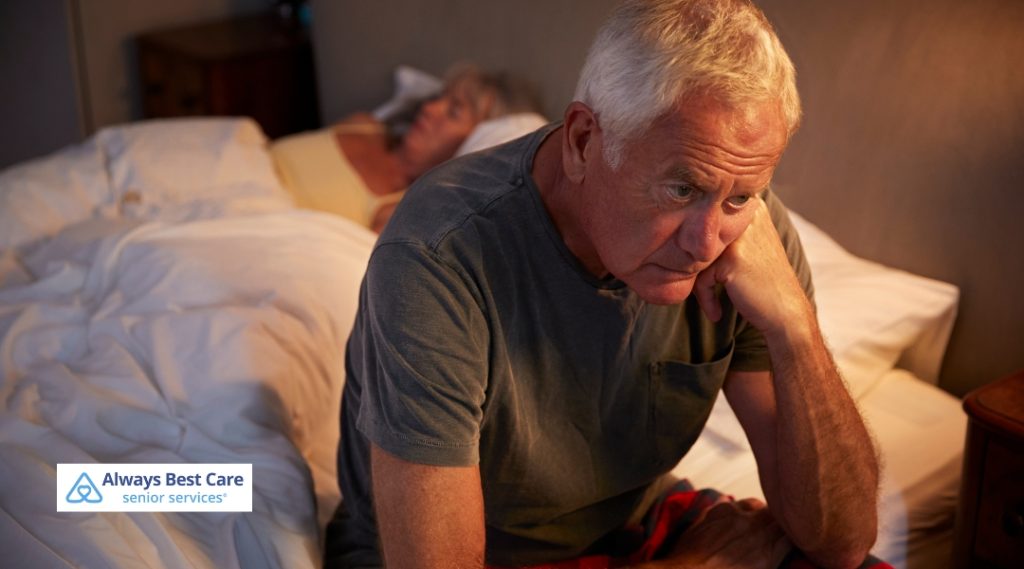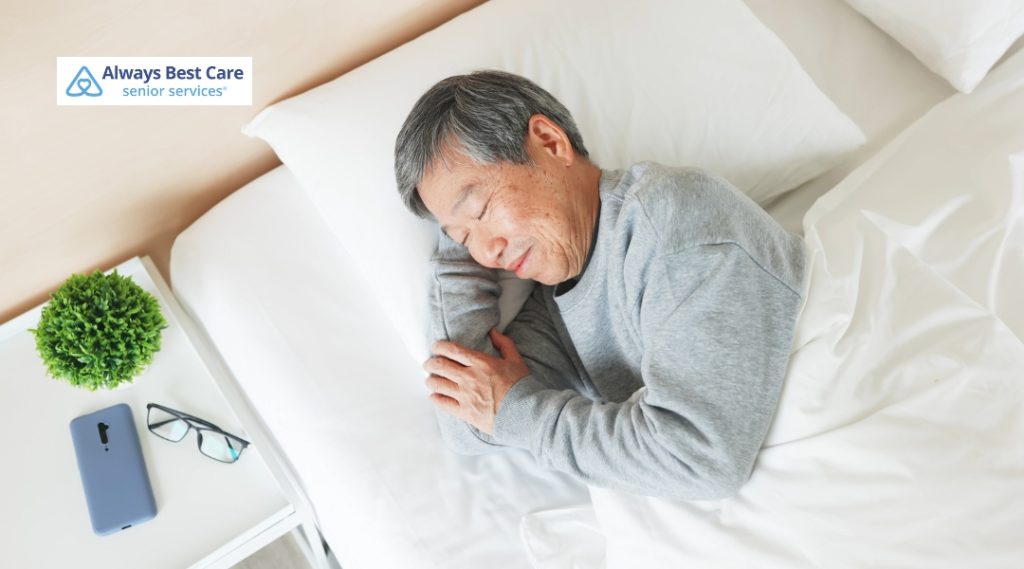How Seniors in Mount Clemens, MI, Can Improve Sleep Quality

Whether it’s tossing and turning at midnight or waking up before sunrise, many seniors quietly accept poor sleep as just another part of aging. But it doesn’t have to be.
In fact, your golden years can be a time to reclaim restful nights and energized mornings. By understanding what’s really behind sleep disruptions and making small, meaningful adjustments, seniors can experience real improvements in how they sleep and how they feel.
From evening routines to in-home care that supports relaxation and structure, our guide is here to help you turn your nights into something to look forward to.
Table of Contents
Why Sleep Gets Tougher With Age
As we grow older, sleep often changes in subtle but frustrating ways. What was once a full night of uninterrupted rest can turn into light sleep, frequent wake-ups, or early mornings that come too soon. But this isn’t just a coincidence—it’s the result of natural shifts in how our bodies function with age.
One key factor is a reduction in melatonin, the hormone that tells our body it’s time to sleep. With less melatonin being produced, it becomes harder to fall asleep and stay asleep. At the same time, the brain spends less time in deep, restorative sleep stages, leading to that “tired even after sleeping” feeling that many seniors know all too well.
Health also plays a role. Conditions like arthritis, diabetes, and heart disease can cause discomfort that interrupts sleep. Some medications, especially those taken for chronic issues, may also have side effects that make sleep more elusive.

Creating Healthy Sleep Habits That Work
Good sleep doesn’t happen by chance—it’s built through consistent, thoughtful habits. For seniors, even small changes to your daily rhythm can have a big impact on how well you sleep. Start by going to bed and waking up at the same time each day, which helps train your body’s internal clock. Then build a soothing pre-bed routine—something simple and calming like reading, listening to gentle music, or practicing deep breathing.
Just as important is what not to do: avoid screen time before bed, skip the afternoon naps that stretch too long, and resist the urge to lie in bed awake for hours. If sleep doesn’t come quickly, it’s okay to get up, do something calming, and return to bed when you feel ready. Over time, your body learns to recognize these routines as signals that it’s time to rest.
Transforming Your Bedroom Into a Sleep Oasis
Your bedroom should be more than just a place to sleep—it should be a space that invites calm and comfort. Start by removing distractions like televisions, bright lights, or clutter. A room that’s dark, quiet, and cool helps the body relax and stay asleep longer. Blackout curtains, white noise machines, or a soft fan can all make a big difference.
Also, take a look at your bedding and furniture. A supportive mattress, cozy blankets, and pillows that suit your sleeping style can relieve pressure points and make it easier to settle in. Add a touch of personal comfort too—maybe a lavender sachet, a soft reading lamp, or a favorite photograph nearby. When your space feels peaceful, your mind and body will naturally begin to follow.

Rethinking What You Eat and Drink at Night
The foods and drinks you enjoy in the evening have more of an effect on your sleep than you might expect. Caffeine and alcohol are two major culprits—both can disrupt your ability to fall into a deep, restful sleep, even hours after you consume them. Heavy meals late at night can also lead to indigestion and discomfort, keeping you awake when you’d rather be drifting off.
Instead, try having dinner a few hours before bed, and if you need a snack later on, choose something light and sleep-friendly, like a banana, a bit of oatmeal, or a handful of almonds.
Staying hydrated throughout the day is important too, but it’s a good idea to limit liquids close to bedtime to avoid those middle-of-the-night trips to the bathroom. With a few mindful adjustments, your nighttime routine can nourish rest instead of disrupting it.
Move More During the Day to Sleep Better at Night
Staying active isn’t just good for your heart and joints—it’s one of the most natural ways to improve sleep. Regular movement during the day helps regulate your internal clock, reduce restlessness, and release built-up tension that can interfere with falling asleep.
For seniors, the key is consistency and finding the right activity level. A brisk morning walk, gentle stretching, gardening, or even light chores can all support better rest at night. Just try to avoid intense exercise too close to bedtime, as it may leave you feeling too alert. By making movement a part of your daily rhythm, you’re giving your body the best chance to wind down and rest when evening comes.

Finding Peace: Managing Stress for Deeper Sleep
A quiet room doesn’t always mean a quiet mind. Stress, worry, and overthinking can follow us into the night, making it hard to fully relax. For seniors, managing stress before bedtime is key to achieving deeper, uninterrupted sleep.
Simple habits like deep breathing, prayer or meditation, listening to calming music, or writing in a journal can ease a racing mind. Creating a peaceful wind-down routine—perhaps with a warm bath, dimmed lights, and a comfortable chair—can help signal to your body that the day is done and it’s time to let go. When your mind is at ease, your body is far more likely to fall into restful sleep.
Could Your Medications Be Causing Insomnia?
If you’ve been struggling with sleep and can’t pinpoint why, your medications could be part of the problem. Many common prescriptions—including those for blood pressure, asthma, depression, and even some pain relievers—can interfere with your ability to fall or stay asleep.
Diuretics may increase nighttime bathroom visits, while others may cause vivid dreams, restlessness, or daytime drowsiness that throws off your sleep-wake cycle. If you suspect your medications are affecting your sleep, don’t stop them on your own. Instead, speak with your doctor or pharmacist about what you’re experiencing. They may be able to adjust your dosage, timing, or find alternative options that support both your health and your ability to get the rest you need.

How In-Home Care Improves Sleep for Seniors
At Always Best Care, we know that sleep isn’t just a nightly routine—it’s a cornerstone of health, especially for seniors. That’s why our dedicated caregivers do more than just assist with daily tasks. We help create an environment and lifestyle naturally supporting deeper, more restorative rest.
Our team works closely with each client and their family to build personalized care plans that promote consistent routines, one of the most important foundations for healthy sleep. From helping with evening hygiene and preparing a light snack to gently reminding clients to take medications on time, our caregivers bring structure and calm to the end of each day.
We also recognize that sleep quality is tied to comfort and emotional well-being. That’s why our caregivers provide compassionate companionship that reduces nighttime anxiety and creates a stronger sense of security. Whether it’s reading a book together before bed, ensuring the home is quiet and safe, or simply being a reassuring presence in the evening, our support helps ease the mind and body into a more restful state.
In-home care with Always Best Care is not just about meeting physical needs—it’s about enhancing overall quality of life. For seniors struggling with insomnia or poor sleep, the consistency, comfort, and care we provide can make all the difference. With our help, restful nights become possible again, bringing brighter mornings and more energy for the day ahead.
Support Healthy Sleep Habits With Always Best Care of Mount Clemens!
At Always Best Care of Mount Clemens, we understand the challenges that come with aging, including sleep difficulties. Our compassionate caregivers can help establish a calming nighttime routine, assist with daily activities, and provide companionship to reduce stress and promote relaxation.
If you or a loved one is struggling with insomnia and needs extra support, we are here to help. Contact Always Best Care of Mount Clemens at (586) 690-7500 to schedule a care consultation and learn how our in-home care services can improve your quality of life. A restful night’s sleep is just a call away.





